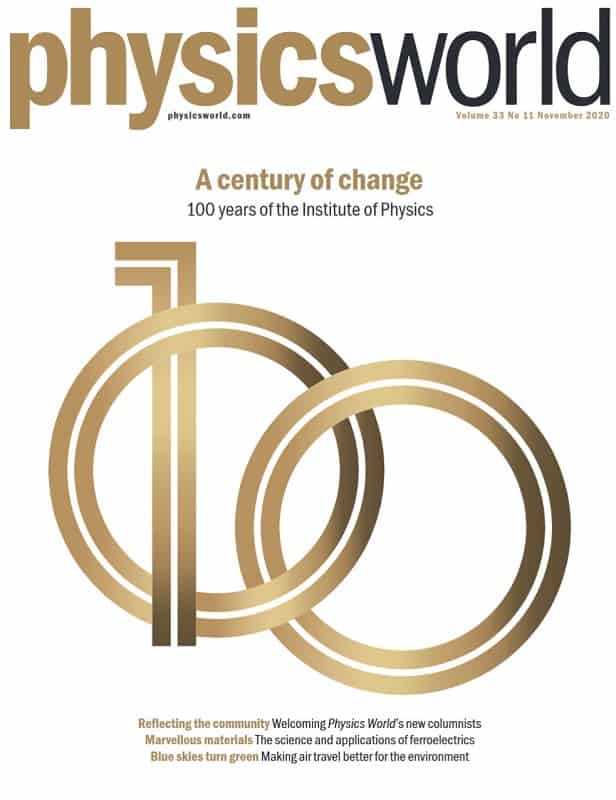When the Institute of Physics (IOP), which publishes Physics World, was founded in 1920, it was to serve as a voice for the fledgling physics community in the UK. Before then, physics had mostly been conducted by a tiny band of elite researchers at a handful of university or private labs.
But with growing demand for physicists in industry, academia and government, more and more people were realizing they could forge successful careers in physics. The IOP was set up to represent their professional concerns, as you can discover in the November 2020 issue of Physics World, which is now out in print and digital formats. You can also read the feature online here.
Elsewhere in the issue, we welcome our new pool of contributing columnists – active and thought-provoking physicists who will bring a new perspective to a range of professional matters such as education, careers, publishing, funding and diversity. There’s also a great feature about the top applications of ferroelectricity and a look at attempts to make air travel greener.
If you’re a member of the Institute of Physics, you can read the whole of Physics World magazine every month via our digital apps for iOS, Android and Web browsers. Let us know what you think about the issue on Twitter, Facebook or by e-mailing us at pwld@ioppublishing.org.
For the record, here’s a run-down of what else is in the issue.
• Superconductivity found at 1.5C – Researchers have created a material that can superconduct at room temperature under high pressures, as Hamish Johnston discovers
• Cosmic pioneers bag Nobel prize – Roger Penrose, Reinhard Genzel and Andrea Ghez win award for their work on black holes, as Michael Banks and Hamish Johnston report
• Celebrating Black physicists – Charles Brown, Eileen Gonzales and Xandria Quichocho talk to Michael Banks about the barriers facing Black physicists and how #BlackInPhysics week aimed to boost their visibility
• Reflecting the community – Matin Durrani welcomes Physics World‘s new pool of contributing columnists
• Keeping your eyes on the prize – Chanda Prescod-Weinstein describes the social and political barriers that Black physicists face in their daily lives
• Making a difference where it matters – With COVID-19 further exposing educational divides, Jess Wade says the importance of physics teachers has never been more critical
• Supporting the next generation – Nicolas Labrosse says that UK research funders must recognize their responsibility to support research into university physics education
• Keeping up with opportunities – Caitlin Duffy says it is more important than ever to consider your next career move despite the challenges posed by the COVID-19 pandemic
• A quantum future – With a new era of quantum technology beckoning, James McKenzie reflects on recent milestones in the quantum computing “arms race”

Online conferences, auxetic materials and a new kind of rocket engine: the October 2020 issue of Physics World is now out
• The bank of success – After helping to set up the first major repository of protein structures 50 years ago, Helen Berman is now significantlyexpanding its scope, as Robert P Crease finds out
• A century of change – The Institute of Physics was created in 1920 to champion a new generation of professional physicists working in industry, academia and the government, as Susan Curtis describes
• Ferroelectricity: 100 years on – When a PhD student called Joseph Valasek discovered ferroelectricity exactly 100 years ago, few people realized the enormous impact it would have on science and technology. Amar S Bhalla and Avadh Saxena pick their favourite applications of this fundamental physics phenomenon
• Physics challenges for green aviation – Commercial air travel has changed a lot since the first aeroplane took passengers around a century ago. Brian Tillotson explores the future challenges to make aviation greener
• The hunt for another Earth: a love story – Kate Gardner reviews The Smallest Lights in the Universe: a Memoir by Sara Seager
• Black hole diaries – Tushna Commissariat reviews The Shadow of the Black Hole by John W Moffat
• Embracing a life of variables – Steve Bullock is an engineer, physics teacher, science communicator and education consultant. Currently the programme director of undergraduate aerospace engineering at the University of Bristol, UK, he talks to Tushna Commissariat about a career of bold choices, sideways jumps and obstacles overcome
